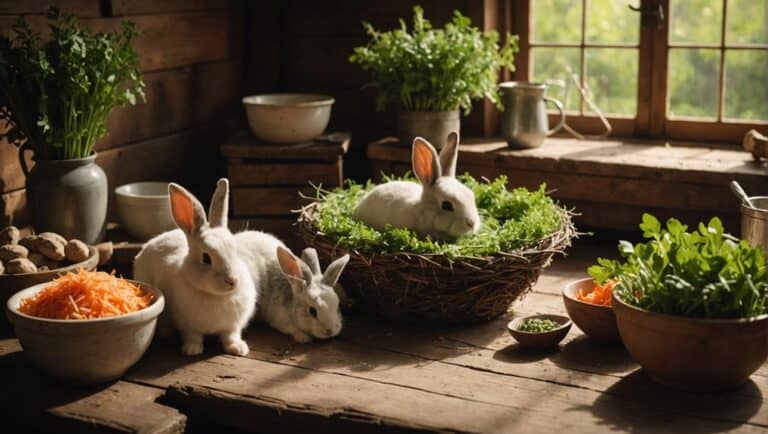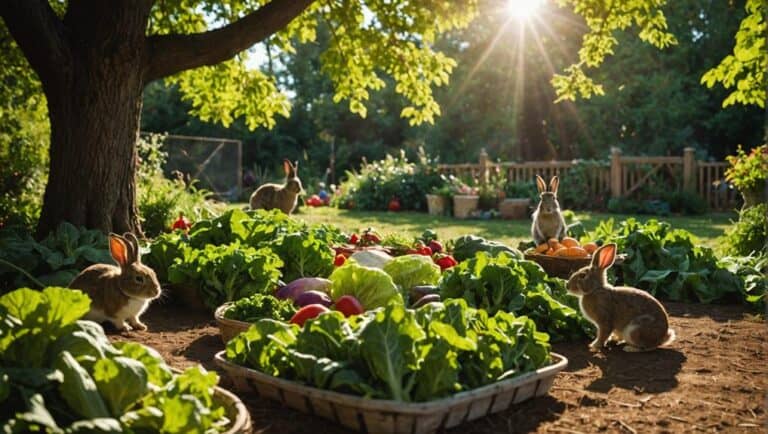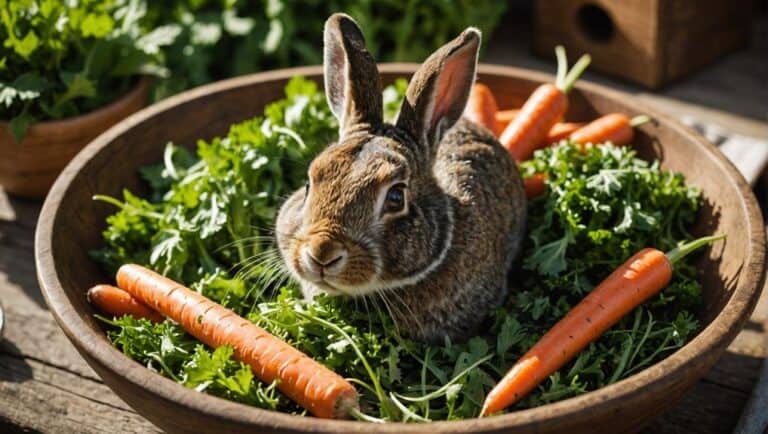When it comes to understanding your pet rabbit's age, weight plays an essential role in providing proper care. You might not realize that newborns weigh just 1-2 pounds, while adults vary considerably based on breed. By keeping an eye on their weight and other physical traits, you can gain insight into their age and health needs. But how exactly do you translate weight into an accurate age estimation, and what implications does this have for their nutrition and care? The answers may surprise you.
Contents
Understanding Rabbit Age and Weight
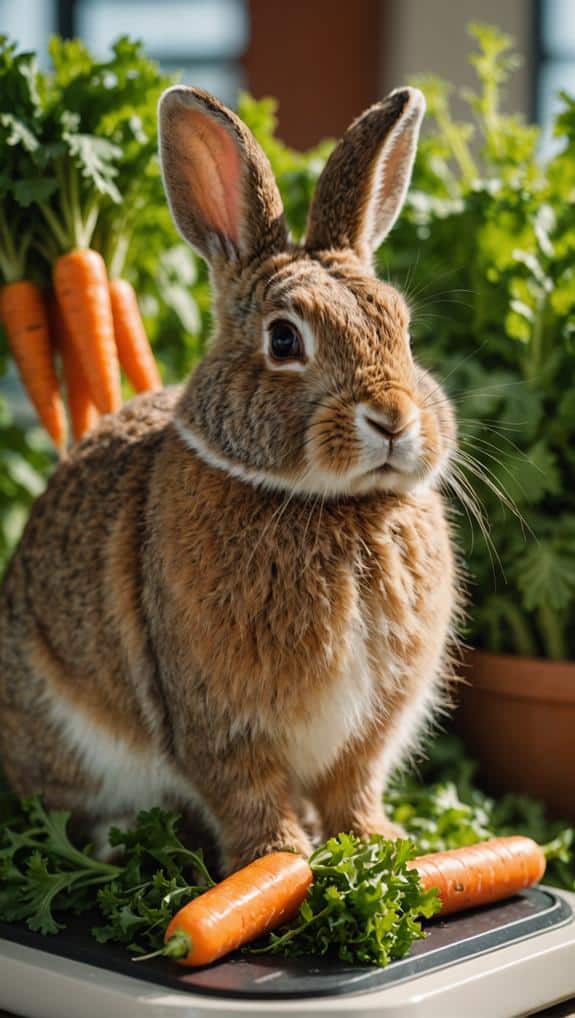
When it comes to understanding your rabbit's age, weight plays an essential role. For instance, a healthy adult rabbit typically weighs between 3 to 6 pounds, while larger breeds can weigh 15 pounds or more.
Young rabbits, known as kits, start at about 2 ounces at birth and gain weight rapidly, averaging 1.5 to 2 pounds by 8 weeks. By 6 months, most rabbits reach around 80% of their adult weight, which varies by breed.
As your rabbit ages, monitoring its weight becomes critical for evaluating health. On average, domesticated rabbits live 8 to 12 years, but age-related health issues may arise around 5 years, especially with noticeable weight changes.
An appropriate diet is crucial; obesity can greatly impact your rabbit's overall health and lifespan. Regular veterinary check-ups are essential, as they can help you identify any weight-related health concerns early on.
Weight Categories for Rabbits
When you're evaluating your rabbit's age and health needs, understanding its weight category is essential.
Rabbits fall into distinct classifications—Dwarf, Small, Medium, and Large—each with specific care requirements and age implications.
For instance, recognizing that cross-bred rabbits exhibit a wider gene pool can help you choose a healthier option for your pet.
Rabbit Weight Categories
Understanding rabbit weight categories is imperative for providing ideal care for your pet. Rabbits are typically classified into three weight groups: small rabbits (up to 3.5 lbs), medium rabbits (3.5 to 10 lbs), and large rabbit breeds (over 10 lbs).
Small rabbits, like Netherland Dwarfs and Mini Rex, require different dietary needs compared to their larger counterparts. To maintain a healthy weight, it's essential to provide a high-fiber diet that aligns with their specific requirements.
Medium breeds, such as Holland Lops and American Fuzzy Lops, often fall in the middle regarding care requirements.
Large rabbit breeds, including New Zealand and Flemish Giant, have unique habitat space and dietary needs due to their size. It's crucial to understand these categories as they can greatly influence a rabbit's lifespan.
Generally, smaller breeds tend to live longer than larger ones, reflecting common aging patterns in animals. By recognizing a rabbit's weight category, you can tailor its diet and environment to promote health and longevity.
This knowledge not only enhances your pet's quality of life but also strengthens the bond you share, ensuring they thrive under your care. Remember, each rabbit has its own unique needs based on its weight category, and your attentive care can make a world of difference.
Age Implications by Weight
Recognizing the weight categories of rabbits not only helps in their care but also sheds light on their aging process. Small rabbits, like the Netherland Dwarf, typically live 8-12 years, while medium breeds, such as the Mini Rex, have a lifespan of 6-10 years. In contrast, large rabbits, like the Flemish Giant, may face size-related health issues that limit their lifespan to around 5-8 years.
Observing ear movements to gauge rabbit emotions can also provide insights into their overall health and wellbeing.
Weight fluctuations can reveal important age implications and indicate your rabbit's health status. Notable weight gain often points to overfeeding or underlying health problems, while weight loss can signal illness or stress. Understanding these dynamics is essential for providing appropriate care.
Maintaining a balanced diet and ensuring regular exercise tailored to your rabbit's size can notably influence their well-being as they age. By monitoring their weight and adjusting care accordingly, you can help prevent potential health issues and enhance their quality of life.
Ultimately, recognizing the relationship between weight and aging empowers you to serve your rabbit better, ensuring they thrive throughout their lifespan.
Age Estimation Methods for Rabbits
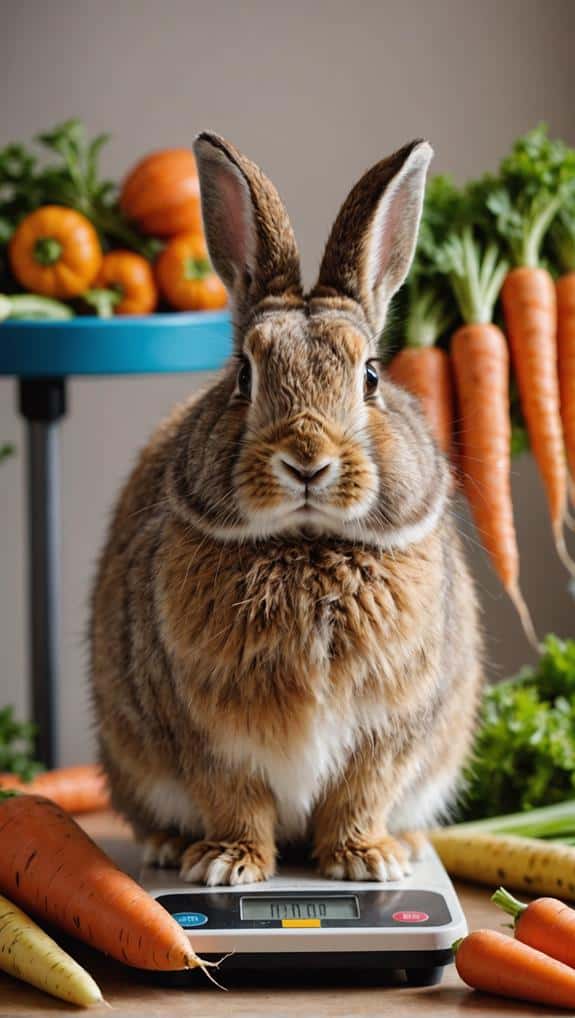
Determining a rabbit's age can be essential for ensuring proper care and veterinary treatment.
Accurate age estimation helps you tailor your care approach, ensuring your furry friend remains healthy and happy. Here are three key methods to estimate your rabbit's age:
- Dental Condition: Check their teeth. Young rabbits usually have clean, white teeth, while older ones often show enamel wear and discoloration.
- Physical Traits: Observe their body structure and ear shape. Younger rabbits tend to have rounder features, while older rabbits display more elongated characteristics.
- Activity Levels and Fur Condition: Monitor your rabbit's energy. Younger rabbits are typically more playful, while older ones are calmer. Additionally, younger rabbits have soft, dense fur, whereas older ones may have coarser or sparse fur.
You should also consider sexual maturity, which occurs around 4-6 months.
This developmental stage can provide further clues about your rabbit's approximate age.
Nutritional Needs by Rabbit Age
How can you guarantee your rabbit’s diet meets its altering nutritional needs as it ages? Understanding the specific dietary requirements at different life stages is essential. As rabbits grow older, their metabolism and digestive health change, necessitating adjustments to their diet. It’s important to incorporate higher fiber content to keep their digestive system functioning properly, while also paying attention to any dental issues that may arise. Ensuring you meet the unique dietary needs of seniors, such as softer food options or specialized pellets, can greatly contribute to their overall well-being and longevity. Regular consultations with a veterinarian can also help to tailor their diet to manage any specific health concerns as they age.
Young rabbits require a protein-rich diet, typically around 14-16%, to support their rapid growth. As they shift to adulthood, you should adapt their diet to include about 10-12% protein while making sure they've unlimited access to hay for the important 15% fiber they need.
For senior rabbits, consider their dental health; they may benefit from a softer diet that includes more pellets and fresh leafy greens, minimizing hard foods that can be challenging to chew.
Regardless of age, hydration is fundamental. Young rabbits need constant access to clean water to aid their development, while older rabbits may require more hydration to support digestion.
Regularly monitoring your rabbit's weight and body condition is necessary to prevent over or underfeeding, which can lead to significant health issues.
Health Considerations for Aging Rabbits
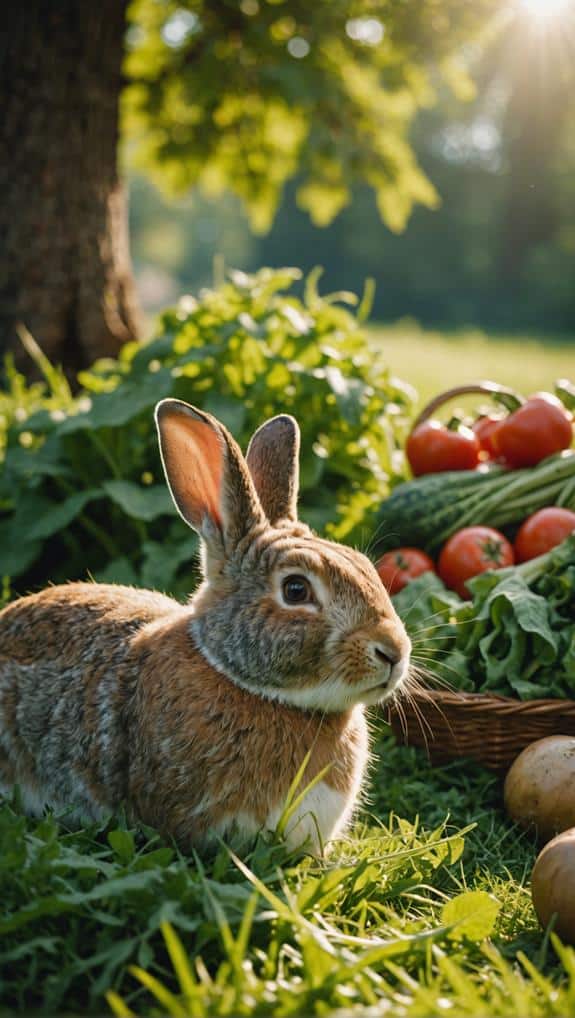
As your rabbit ages, it's important to be aware of the health considerations that come into play. Rabbits typically enter their senior years around 5-6 years old, and with this shift, you may notice changes in their mobility and dental health.
Here are three key areas to focus on:
- Regular Check-ups: Schedule veterinary visits to catch age-related health issues such as arthritis, heart disease, and kidney problems early. Regular check-ups can make a significant difference in your rabbit's quality of life.
- Balanced Diet: Make certain your aging rabbit receives a proper diet. Focus on high-quality hay, fresh vegetables, and specialized pellets to maintain dental health and prevent obesity. A well-balanced diet is vital for overall health.
- Safe Environment: Create a comfortable living space that encourages gentle exercise. Providing a safe environment helps your rabbit maintain mobility and mental stimulation, necessary for their well-being.
Monitoring Rabbit Weight and Age
Monitoring your rabbit's weight is essential for estimating its age and ensuring its overall health.
By regularly weighing your pet, you can identify any significant changes that may indicate health issues.
Understanding the growth patterns associated with different breeds will help you provide the right nutrition and care throughout their development.
Weight Tracking Importance
Keeping track of your rabbit's weight is essential for ensuring its overall health and well-being. Regular weight tracking not only helps you monitor growth but also allows you to spot potential health issues early on.
Here are three key reasons why weight monitoring is important:
- Prevent Obesity: Rabbits can easily become overweight due to overfeeding or insufficient exercise, leading to serious conditions like heart disease and arthritis. By monitoring their weight, you can help prevent these issues.
- Adjusting Nutrition: As your rabbit grows, its nutritional needs change. Weight tracking enables you to adjust nutrition effectively, ensuring younger rabbits receive the right calories for growth while helping adults maintain a healthy weight.
- Estimate Adult Size: Knowing your rabbit's current weight in conjunction with its breed can provide insights into its expected adult size. This information is essential for preparing suitable living environments and creating appropriate exercise plans.
Age Estimation Techniques
When you're trying to determine your rabbit's age, examining its weight can provide valuable insights. Young rabbits usually weigh around 1-2 pounds at birth, and by 8 weeks, they can grow to 4-5 pounds. Monitoring this growth is vital for estimating age accurately. Smaller adult breeds generally average between 3-6 pounds, while larger breeds can exceed 10 pounds when fully mature.
To get a clearer picture, observe not just weight but also height and body condition. This combination offers a more thorough view of your rabbit's health and helps in pinpointing its age.
Regular weight checks are important; tracking these patterns allows you to identify any deviations from expected growth rates, which could signal health issues.
Additionally, remember that each rabbit is unique. Factors like genetics and diet play roles in growth, so be prepared to adjust your estimates based on your rabbit's specific characteristics.
Final Thoughts
Ultimately, understanding your rabbit's age through its weight isn't just a technical exercise; it's a gateway to nurturing a vibrant, healthy companion. By keeping an eye on their weight and adjusting their care accordingly, you're ensuring they thrive at every stage of life. Remember, as your furry friend gracefully ages, meeting their evolving needs will keep those playful hops and gentle nudges coming. Embrace this journey with love and attentiveness, and your bond will flourish.

